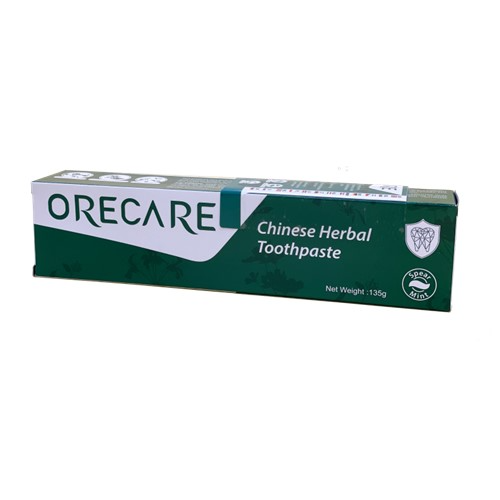
HARMONY | RESPONSIBILITY | PROSPERITY
Personal Care

Orecare Chinese Herbal Toothpaste
Chinese Herbal Toothpaste Orecare contains extracts from original Chinese herbs used in China for thousands of years.
Description
Chinese Herbal Toothpaste Orecare contains extracts from original Chinese herbs used in China for thousands of years. Their effective action ensuring the health and protection of the teeth has been confirmed in many studies conducted in their homeland - Asia. The ingredients ensure the reduction of gum bleeding, prevent caries, which is the main cause of dental pain, and stop the development of tooth crown, neck and root infections. Although the herbal components of the paste are highly concentrated, they are easily dissolved by saliva, and thus accelerate the action of the paste.
Description
The main components of the paste are extracts from Japanese honeysuckle, wild chrysanthemum and the Chinese herb Sarcandra glabra. It contains also tea tree oil, silica, coconut oil and peppermint. Japanese honeysuckle (Lonicera japonica) is a plant used in Chinese natural medicine for thousands of years. Its phenomenon has been confirmed by studies conducted by Asian scientists. Thus far they have managed to isolate from it more than 140 chemicals that have wide pharmaceutical applications. Japanese honeysuckle contains substances essential for a good oral hygiene, such as luteolin, saponins and tannins exhibiting anti-inflammatory, antibacterial and astringent properties. Sarcandra glabra is a plant originating from southern Asia. It is used in traditional Chinese medicine in the treatment of bruises, bone fractures, nausea and coughing. A number of active ingredients, such as fumaric acid, flavonoids, essential oils or chlorogenic acid relate to the antioxidant, anti-inflammatory and anti-fungal properties of the herb. The infusion from the flowers of wild chrysanthemum (Chrysanthemum indicum) is a traditional type of tea in China and Korea. It is widely believed that drinking this tea is beneficial to health. Consequently, the traditional medicine from the Far East has used this plant for thousands of years in the treatment of hypertension or inflammations of the oral cavity. Contemporary research has shown that wild chrysanthemum contains active ingredients, including essential oils, that possess antibacterial, anti-inflammatory, analgesic and antioxidant properties. The effects of the main components of the paste are supported by additional ingredients such as tea tree oil which helps reduce gum bleeding. Coconut oil,in contrast, reduces bad breath and has strong cleansing properties. The product does not contain ingredients with abrasive properties , yet the presence of high-quality silica provides thorough teeth cleaning while maintaining the protective functions. Silica gently polishes the teeth causing them to become shiny and gain a healthy look. The toothpaste has a minty flavour, which guarantees a unique feeling of freshness.
ACTION
The individual components of the toothpaste have the following properties:
The individual components of the toothpaste have the following properties:
- Luteolin, saponins and tannins present in the Japanese honeysuckle have strong antibacterial and anti-inflammatory properties. Consequently, they provide protection against dental caries and bad breath.
- Sarcandra glabra extract has anti-inflammatory and anti-fungal properties.
- The components of the wild chrysanthemum extract support the antibacterial, anti-inflammatory, analgesic and antioxidant action.
- Tannins have hemostatic properties, reducing gum bleeding and swelling.
- The gentle cleaning properties of silica help conserve natural white teeth while protecting the enamel.
- Silica helps remove plaque and prevents tartar.
- Silica effectively enhances the enamel hardness and its resistance to acids.
- Peppermint ensures fresh breath.
APPLICATION
Use the toothpaste at least twice a day - especially in the morning and evening - for 3 minutes. It is, however, recommended to brush the teeth after every meal.
Use the toothpaste at least twice a day - especially in the morning and evening - for 3 minutes. It is, however, recommended to brush the teeth after every meal.